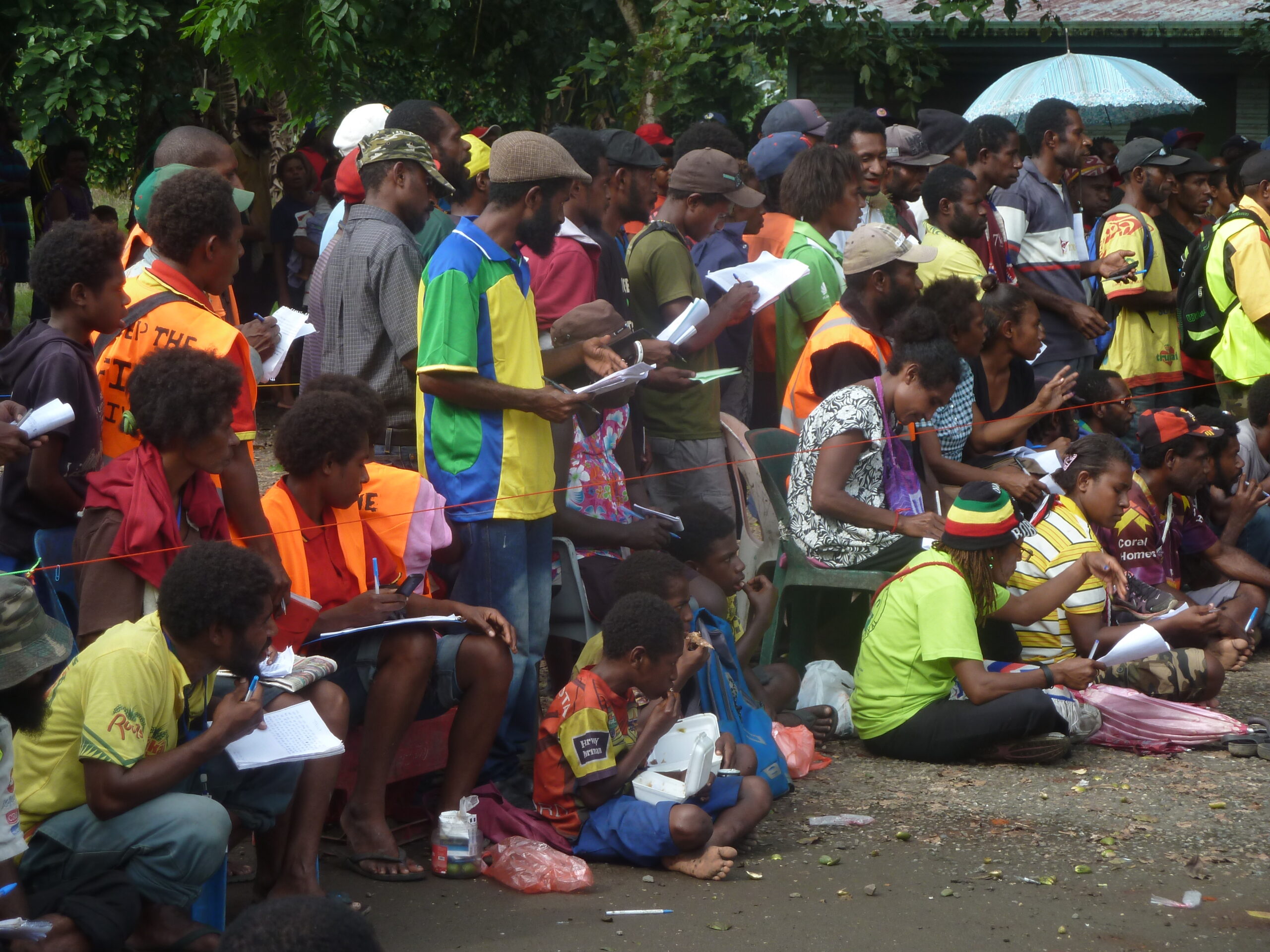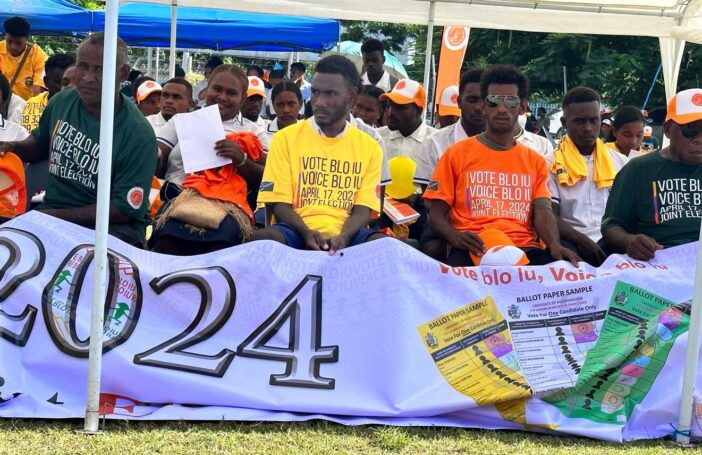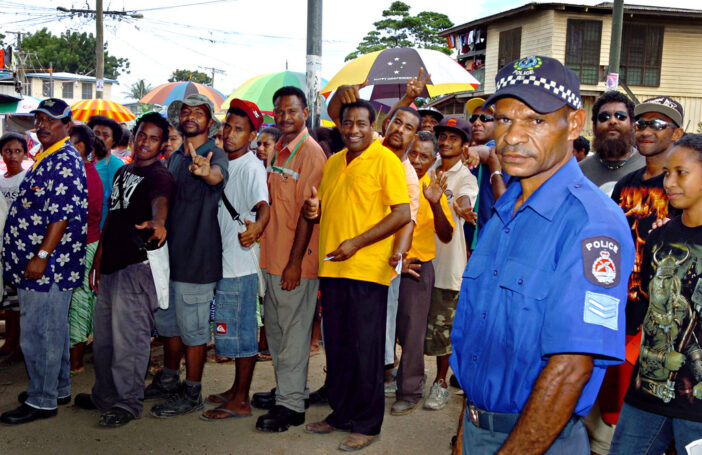In early August, MP Nick Kuman sponsored a private member’s bill in Papua New Guinea’s parliament designed to replace the country’s Limited Preferential Voting (LPV) electoral system with First Past the Post. If successful, Kuman’s bill will reverse changes implemented after PNG’s 2002 election.
Unlike First Past the Post – in which voters simply placed an ‘X’ by the name of the candidate they wanted as their MP – in LPV voters rank their three most preferred candidates. Votes are counted in rounds and in each round the lowest polling candidate is eliminated. With each elimination, the ballots of people who had selected that candidate as their top preference are reallocated to their next most preferred candidate still in the running.
Kuman has personal reasons to dislike LPV. In 2017, he saw his 4,050-vote lead shrink to just 391 as preferences were reallocated. Kuman isn’t alone in his dislike of LPV though: academics have argued about its merits since the 1990s.
In the early days, these debates were as much hypothetical as real: LPV hadn’t had time to prove its worth. But there have now been three general elections using LPV. Enough to assess its costs and benefits, and to answer a more practical question: is Kuman’s proposal a good one.
Frustratingly, some evidence remains elusive. Elections don’t come cheap in PNG. It would be useful to know how much LPV added to their price tag. Cost was cited by former Prime Minister Peter O’Neill when he proposed the country return to First Past the Post in 2018. (O’Neill now appears supportive of LPV.) LPV prolongs the time taken to count ballots, so must increase costs somewhat. Yet there isn’t enough public information to estimate exactly how large that ‘somewhat’ is. It’s true the cost of elections rose rapidly between 2002 and the first LPV election in 2007. But this was partly due to increased security after the violence of 2002. Election costs also grew considerably between 2007 and 2012, an increase that can’t be laid at the feet of LPV.
We’ve been told by aid workers previously based in PNG that the largest electoral costs come from polling station security and logistics. LPV’s longer counting process adds to this. But compared to overall election spending – at least from what we’ve been told – the increases probably aren’t outlandish.
There’s better evidence on another potential downside to LPV: vote buying. Vote buying has increased, something often attributed to LPV. LPV may have had an impact, but it’s unlikely to be the main cause. Vote buying has also increased considerably in neighbouring Solomon Islands even though it uses First Past the Post. A more likely culprit is something both countries have in common: the money emanating from extractive industries that sloshes around their politics.
One final downside of LPV is real but small. LPV is more complex. It’s easier for voters to make mistakes. In a 2019 study, we found (page 31) invalid ballots increased after LPV was introduced. But we also found the increase was small, and possibly falling with time.
LPV has come at a cost. But the costs aren’t huge. What about the benefits?
Anyone hoping LPV would transform PNG’s politics must surely have been disappointed by now. As we also showed in our 2019 analysis (pages 30 to 35), election results haven’t changed much. The vote shares of winning candidates have gone up, as would be expected given they now include reallocated second and third preferences. Vote shares haven’t gone up that much though: in 2017 the median winner still only gained 31% of all votes cast. And, tellingly, sitting MPs are losing elections as often as ever. To the extent that turnover rates reflect voter dissatisfaction with MPs, voters seem no more satisfied than they were under First Past the Post.
And although governance, as measured by the World Bank, did improve for a while under LPV, the trend started before its introduction, and reversed in 2014.

At first it looked like LPV had reduced electoral violence. This would have been a major achievement. However, violence flared badly in the 2017 elections. Perhaps matters may have been worse still without LPV. That seems possible given deteriorating law and order more generally. But, disappointingly, LPV clearly hasn’t eliminated electoral violence.
In these areas LPV has fallen short of what was hoped.
Yet there’s more to the story. When we studied results (page 36) we found evidence that, on average, LPV provided a small boost to women candidates. A small boost is no substitute for more substantive change. But it’s helpful.
We also found (pages 38 to 44) suggestive evidence that voters used their second and third preferences in the 2017 election to vote against the unpopular government of the day. In PNG, where politics is dominated by local concerns, voting focused on national issues, even if it only involves preferences, would be an important change. It’s too early to tell, and our evidence isn’t definitive, but it hints at genuine potential.
LPV also appears popular with voters. No one has surveyed people in PNG about LPV, or if they have, they haven’t made their findings public. (MP comments reported in a 29 August Sunday Chronicle article, which isn’t online, suggest the government conducted a survey of sorts in the past, and found majority support for LPV.) There certainly hasn’t been any sign of voter backlash, and focus group research found predominantly positive views. The reasons why voters like LPV often aren’t profound – an acquaintance told one of us he liked LPV simply because he was able to vote for all three cousins standing last election, sparing himself family friction. This isn’t transformative change, but if it helps voters, even in minor ways, and this makes LPV popular, it counts for something.
Combined, these achievements aren’t overwhelming. We wouldn’t advocate for LPV elsewhere. Yet, we think that, on balance, LPV’s achievements, and its apparent popularity, are sufficient grounds for keeping the system in PNG.
There’s another reason why it would be a mistake for PNG to abandon LPV right now. Even if Kuman isn’t motivated by his performance in 2017, other MPs may well vote using that calculus. That’s not how the rules of the political game should be written.
Electoral rules should only be changed through a structured, deliberative process, involving national public consultation, and clear assessment criteria. Anything else is just foxes redesigning the political henhouse.
Now is not the time for PNG to abandon LPV. The case for change is weak. And the process flawed.






I have designed a voting system that I believe will help you called the “Preferential Linear Electoral Ranking System” (PLERS) which is a means of achieving the benefits of preferential voting, without its complexity and shortcomings.
I have gone through the steps of documentation and now have PLERS on a website.
The address is http://www.netspeed.com.au/erikjoch
My aim is to have this system replace our current Australian and other government voting systems.
Can you please distribute this within your organisation for consideration.
Working spreadsheets in xlsx are available on request.
Regards Erik Jochimsen
Thanks to the authors for an excellent blog. It is suggested in the blog that there’s a “…potential downside to LPV: vote buying. Vote buying has increased, something often attributed to LPV.” May I suggest that perhaps vote buying is an intended upside of LPV? My reasoning follows.
As implied in the blog, a specific original design objective of LPV was inclusivity – FPTP elections were becoming characterised as violent zero-sum affairs, by candidates firstly monopolising their base vote (less than 10% of vote in some elections), and then doing anything possible (no holds barred!) to prevent their rivals from getting their monopolised votes entered into the formal count.
Instead, the basic formula for winning LPV elections is that the candidate with the most 2s and 3s wins (after they’ve avoided elimination through early rounds with their high count of 1s). This requires complex negotiation with enemies and rivals, deal-making, and compromise. These negotiations between rival camps happen many months (sometimes years) before elections. Seen from one angle this looks suspiciously like the roots of inter-group social capital.
The latter may be seen by some as the “corruption” of LPV elections. If it is, it’s important to remember the old maxim about corruption from Samuel Huntington (paraphrased) – “if not corruption, then direct political violence”.
Perhaps a pragmatic view is that PNG elections aren’t going to look like Denmark in the near future, but that the “vote-buying corruption” of LPV is better than the only realistic alternative, which is the zero-sum all-or-nothing game of FPTP?
In some respects, elections are not about who wins or loses. One of their most important functions is as a participatory exercise that engineers the legitimacy of the state. With that objective in mind, LPV should be seen as successful. FPTP elections resulted with winning candidates with less than 10% of the available vote connected to them. The average for LPV is much better. If state legitimacy is an issue (which it is, in PNG), the objective should be to maximise the connection between each individual voter’s ballot paper, and the individuals who end up in Parliament.
Durable governance improvements are never silver bullets. They are simply bricks that seek to shore-up perpetually fragile human systems that attempt to organise raw power. Perhaps LPV should be seen in this light. There are no silver bullets for PNG governance, but it looks like LPV nudges the complex system in the right direction. In the real world, this is better than the alternative. The governance system of modern Denmark is just an assemblage of a myriad of small nudges and bricks over many hundreds and indeed, thousands of years. It wasn’t built in a day.
Thank you Kurt,
That’s an excellent, interesting comment.
My understanding is that part of the original academic case for LPV was that it would make campaigning less zero sum and more transactional, fostering cooperation. Although I don’t think the original designers envisaged “transactions” in the form of vote-buying. Rather, they were thinking more along the lines of “you get my second preferences, I get yours, and we don’t fight.”
Regardless, I agree with you that vote-buying is better than violence. (Or, more accurately, less bad).
At this point, an opponent might say that we’ve gotten both vote-buying and violence, which is true. Although, of course, I don’t think LPV really caused the vote buying, and it’s always possible violence would be worse still without LPV.
Thanks again for an interesting, insightful comment.
Terence
Thank you for the very interesting assessment. In Europe, a regional body called the European Commission for Democracy through Law, aka the Venice Commission, has been quite helpful in developing standards and codes of good practice in the area of elections, for countries transitioning to democracy after the fall of the Berlin Wall. Additionally, it provides expert opinions on electoral legislation. One of the recurring recommendations to national governments has been to refrain from making significant changes to the electoral system within one year from the anticipated election date. Its approach is non-directive, but dialogue with key electoral stakeholders in countries usually helps socialize its recommendations. I wonder if a similar regional advisory body would add value in the Pacific Region.
Thanks Ancuta,
It’s a very interesting suggestion. And it’s good to hear about the European experience.
I think the big questions to be answered regarding the potential for something similar in the Pacific would be:
How would it fit within existing Pacific regional frameworks, entities and undertakings?
And to what extent would it be possible to get buy-in from Pacific country governments?
If nothing else it would be interesting to see some form of study conducted on the potential.
Thank you for raising the issue.
Terence
It would be interesting to know empirically whether or how the urban/rural distribution of votes has impacted outcomes under both systems. There is an anecdotally strong argument that FPTP voting benefits candidates who can win the urban vote which is to the detriment of the rural vote in an electorate. LPV on the other hand means a candidate has a stronger incentive to try to appeal to both the urban and rural vote, therefore being more inclusive.
Thank you David. It’s an interesting question (although I would substitute the word ‘urban’ with ‘most populous communities’). It’s a hard one to test with limited available data unfortunately.
One point that may be of interest/relevance is that surprisingly few results change as preferences are counted. In 75% of seats in 2017 the ultimate winner was also ahead after first preferences. (See page 35 of the paper linked to in the blog post.)
Thanks again for your comment.
Terence
Totally agree with the concluding view – “Electoral rules should only be changed through a structured, deliberative process, involving national public consultation, and clear assessment criteria. Anything else is just foxes redesigning the political henhouse.” – Amendment to an Organic Law should be by wider public consultation. It should never be a private member’s bill, whatever the legal arguments.
Thank you Winston. As you say, process is important for changing something as central as an electoral system. Thanks again.